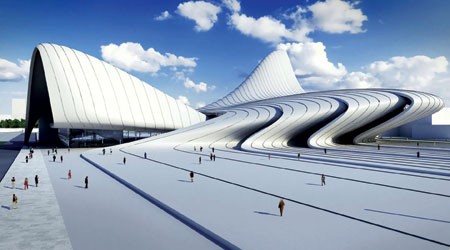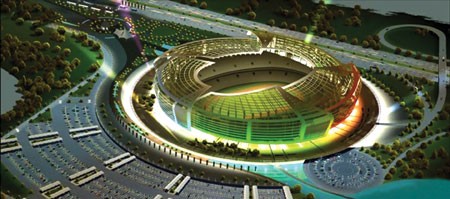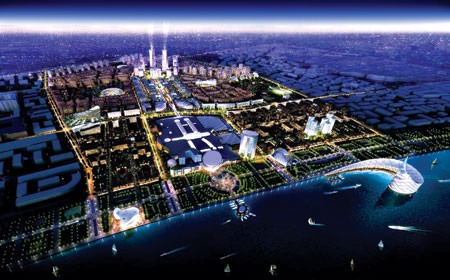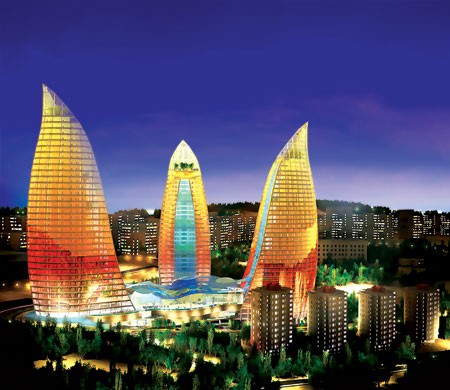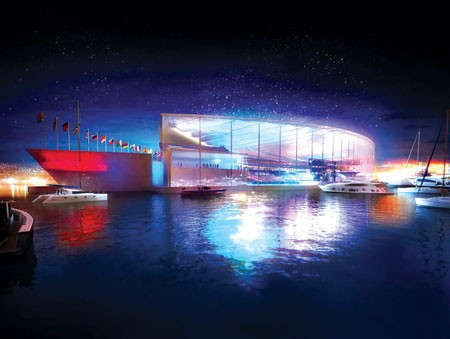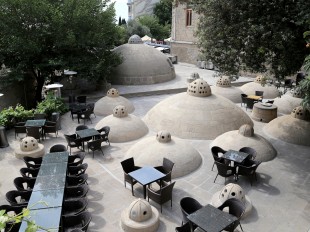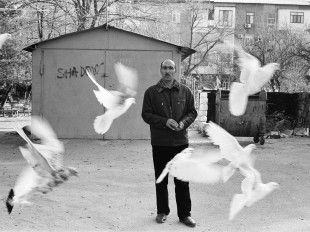Heydar Aliyev Centre ready in 2012
One of the largest-scale projects is the building of the Heydar Aliyev Centre. This modern cultural centre, begun in 2007, will have a multi-functional, complex structure connecting halls equipped with the latest technology. What surprises await visitors? Well, the building will house a library and media centre with on-line access to a store of unique works and world-wide media, exhibition halls displaying local and global fine arts treasures, a museum with exhibitions, multimedia and virtual, relating the country’s history and cultural heritage, as well as a conference hall accommodating up to a thousand visitors.The open public area will have a foyer inside the centre’s two entrances, twenty-four-hour parking for 1,250 vehicles and various other facilities. It covers 15.25 hectares and will consist of three main structures in a single complex. Users of the media centre will be able to use the library individually or in groups. A number of rooms will be sound insulated. The museum and cultural heritage centre, 10,854 square metres, will be in three sections. The first section, six metres in height, will hold a gallery of 20th century and modern Azerbaijani art. Temporary, versatile exhibition galleries will operate in the second section where modern local and international art works will be on display. Galleries holding extensive information about Azerbaijan, our people, history, statehood and culture, as well as national and other collections, will be located in the third section. The spacious, column-free conference hall, 27,880 square metres in area, will have the most sophisticated engineering and logistics in the centre. A private entrance, transport and special access for the disabled are planned. The underground parking will have 4 floors and be topped by a picturesque green space as well as facilities for leisure and entertainment. The end of 2012 should see construction completed of a complex masterminded by world-famous architect Zaha Hadid and built by the DIA Holding FZCO company. The Heydar Aliyev Centre is being constructed on Heydar Aliyev Avenue, near the Excelsior hotel.
Baku Olympic stadium - soon the largest in the Caucasus
The other large-scale construction in Baku is the Olympic Stadium. Construction began in 2011 with the ground-breaking ceremony attended by President Ilham Aliyev, FIFA President Sepp Blatter and Michel Platini, President of UEFA, along with other guests from the world of football.The Baku Olympic Stadium, capacity 65,000, will be in fine, modern style and will take pride of place among the capital’s sports facilities. Multipurpose stands, a running track and other facilities will be included. With an inner area of 120,830 square metres, construction will be in accordance with the International Building Code (IBC), as well as those of UEFA and FIFA. Design work began in 2008. The stadium is being built in the Boyuk Shor settlement of Baku, near the Azizbeyov metro station and is expected to be in operation in 2015. TOCA (The Office of Contemporary Architecture) company of Turkey is responsible for both design and execution and the prime cost of construction is 1 billion US dollars.
The stadium, which will be the largest in the Caucasus, will stretch across 32 hectares (roughly equivalent to 45 football pitches), 300,000 square metres of it under cover, and it will stand approximately 45 metres high. There will be a press centre, a swimming pool and a green area nearby. 41 lifts, 18 entrances and 7 parking areas (for 3,617 cars) will assist mobility. In bad weather a self-cleaning membrane roof will close over the stadium and stands. Michel Platini expressed satisfaction with the project and was certain of a great future for football in Azerbaijan. Sepp Blatter declared it a momentous occasion and an excellent project:
Azerbaijan’s Tofig Bahramov was a man who made a name for himself. You will witness a special arena for football in this stadium, ensuring a bright future for young footballers.
We should add that FIFA’s Under 17 Women’s World Cup will be staged in Azerbaijan in 2012.
White City project
White City is one of the modern world’s biggest projects and will be built entirely on an ecologically-reclaimed industrial zone.Black City grew at the end of the 19th century in the east of Baku. An inheritance from the first oil boom, the result of urban development from a distant past, it has been central to the oil industry for over a century, the site of refining, storage and transportation of the black gold. Following a decision to restore and re-plan Black City, the Atkins company (Great Britain) has been chief adviser to the White City project. Alongside local specialists, Foster and Partners (UK), established by legendary architect Norman Foster and the American architectural bureau F+A Architects, with their globally-renowned experience in the design of retail projects, are also involved to the project. Once underway, the industrial Black City will become a memory, giving way to harmony and comfort and renamed Baku White City, assuming the mantle of a new modern centre in the region’s leading metropolis.
An area larger than Monaco and 11 times the size of the Inner City will be transformed into the largest district in the Caucasus region. Upon completion the population of White City will rival that of Andorra. When completed, White City will have 48,000 workplaces and, most importantly for car-rich Baku, parking for 40,000 vehicles. There will be a Ferris wheel 65 metres high, twice the height of the one on the Boulevard and higher than the Roue de Paris -. White City’s Fountain Square will be twice the size of Baku’s current focal point and Baku City Mall will be the capital’s largest shopping attraction. The new Fountain Square will boast a modern Open Mall connected to Baku City Mall by Nobel Avenue Bridge. The Baku White City project was actually declared Best Future Project in Central and Western Asia at the MIPIM Asia Awards 2011 (Hong Kong).
Baku Flame Towers
Construction of these works of fantasy began in 2008, promising to become one of the city’s most striking edifices and the three towers will fulfil different functions. One, the Hotel Tower, will function as a 328-bed hotel; the second, the Office Tower, will be a business centre and the third, Residential Tower, will offer 140 apartments. The hotel complex will rise 37 storeys, the business centre 34 storeys and the residential building will have 39 storeys. The highest storey will reach 300 metres above sea level. According to the architects, this will be the highest building point in the city. All buildings in the complex are equipped with central heating and air-conditioning. The Hotel Tower will be a true paradise for its guests; every facility here, from windows to room doors, is computer-controlled, with press-button control in every room. There will be a green space in the upper part of the three-storey shopping mall. Each building will have its own private swimming pool and there will be five cinemas in the complex. All three buildings will have car parking; in total more than 1,100 spaces. The complex’s name was no random choice; this, after all, is the Land of Fire. Thus, tourists intending to arrive for the Eurovision Song Contest will be greeted not only by the fiery passion of the continent’s singers, but also by the Baku Flame Towers.A Crystal Hall for Eurovision
Preparations for the Eurovision Song Contest are, of course, well underway in Baku, and construction work on the venue is in the hands of highly reputable companies. Work is also continuing to further develop the nearby National Park. Nazim Majidov, of the Maritime National Park Department, has said that the Boulevard will be extended from four to seven kilometres in length by the time of the Eurovision 2012 song contest. The area between Baku’s Sports Palace and State Flag Square has already been cleared and improvement work is underway. It is expected to be open to the public in March, at the same time as work on the existing section, near ‘Sadko’ café, is completed.One innovation is the designation of a cycling path; six pedestrian crossings are also under construction. All facilities will be provided with POS terminals at which people will be able to access their cash in various currencies. It will also be possible to make non-cash payments in cafes and Mr. Majidov promises that in a few months there will be more pleasure boats operating from the Boulevard.
As for security, cameras are being installed and the National Park Department’s security staff have begun special training in the lead up to Eurovision: 30 of the 70 personnel are attending courses in English. The Baku Business Centre on the Boulevard is currently preparing a Eurovision centre which will house a museum illustrating the contest’s 57 year history as well as a press centre for the 2012 competition, with plenty of space for press conferences. All information about the Eurovision-2012 project will be transmitted through the interactive centre, which is expected to open very soon.
These are only some of the projects currently under construction in Baku. We will follow other imaginative developments in our next issue….
